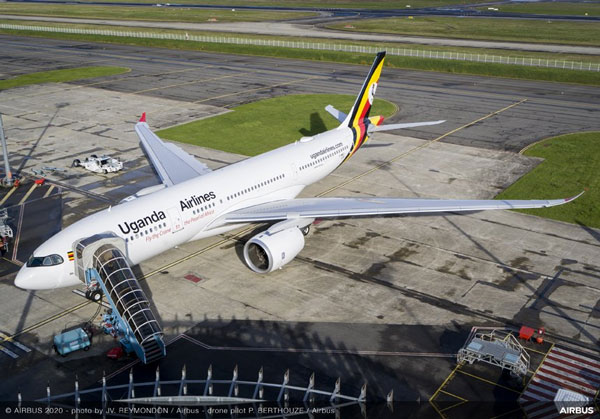
If Uganda is serious about developing new routes to connect the country, it is imperative that a dedicated route development project is formed with a focused team to drive it.
COMMENT | DEREK NSEKO | A few weeks ago, the East African Community block advanced plans for air transport liberalization. It got me thinking about the possibilities; greater connectivity, lower fares and as a result stimulated demand. Its a cocktail of desirables for the East African traveler. Uganda Airlines is now a significant part of this equation as the designated carrier of Uganda. It has been five years of the national airline’s journey toward regional and global connectivity.
Recently, the airline unveiled an expansion of its route network, adding new destinations: Abuja in Nigeria, Lusaka in Zambia, and Harare in Zimbabwe. The expansion brings Uganda Airlines’ reach to 13 countries, serving 17 destinations with 20 routes, solidifying its role as a strategic player in the region’s aviation sector.
The economic impact of this route expansion cannot be overstated. With Abuja being one of Africa’s fastest-growing cities, another direct link between Uganda and Nigeria opens up numerous opportunities for trade, investment, and cultural exchange. Nigeria is Africa’s largest economy, and fostering direct connections with such a powerhouse is strategic for Uganda’s economic diversification. Similarly, Lusaka and Harare are crucial economic centers in Southern Africa. By connecting to these cities, Uganda Airlines is not just serving passengers; it’s creating a bridge for business communities, investors, and tourists to explore the untapped potential of the region.
Tourism, one of Uganda’s key economic sectors, stands to benefit immensely from this expansion. I have been a strong advocate for increased air connectivity as i appreciate its impact on the appetite for tourists to travel to the country. Its an important part of the formula for tourism success so the national airline’s new routes are a welcome development. The airline’s growing network facilitates easier access for tourists seeking to explore Uganda’s rich cultural heritage, diverse wildlife, and breathtaking landscapes. This influx of visitors will have a ripple effect, boosting sectors such as hospitality, transport, and local culinary businesses. Additionally, enhanced connectivity can attract multinational companies looking to establish regional offices in a centrally located and well-connected country.
Explore Harare’s hidden gems: from lush botanical gardens to historic landmarks like the National Gallery.
Book Flight today through our Website or Mobile App:https://t.co/0WqveKsLdB#FlyUgandaAirlines pic.twitter.com/4quJBNoipv
— Uganda Airlines (@UG_Airlines) September 19, 2024
While alot of African airlines tend to focus on blue ribbon routes connecting to big name destinations such as New York, London, Paris etc, this mindset has left our continent poorly connected, creating a situation where some cities within Africa can only be connected by air via a gulf or European hub. It is unacceptable and intra African routes should be encouraged. So beyond direct economic benefits, the expanded network enhances Uganda’s geopolitical significance. The new routes signify more than just flights; they represent Uganda’s commitment to being an active participant in the narrative of a connected, prosperous Africa.
It is easy to assume that the existence of the national airline is a given. Afterall it is a national asset with the full support of the country’s purse. However, the past few years have taught us that even governments can give up on supporting national airlines especially in the face of black swan events such as covid. So it’s important that the airline continues to justify its investment to the taxpayer. Five years is a landmark worth celebrating. However, it should also signify a shift in gears from startup phase to establishing sustainable growth. It is an important time in the national carrier’s trajectory.
Route expansion in the airline industry is a complex and strategic process that involves much more than just adding new destinations to a network. It requires detailed planning, coordination, and investment to ensure the new routes are profitable, sustainable, and beneficial for both the airline and the broader economy. From an African context, the lack of a liberalized air transport market means that launching new routes, especially internationally, often involves navigating complex regulatory frameworks. New routes are often restrictive and their operation is guided by negotiated bilateral air service agreements (BASAs) between countries. These agreements determine the frequency of flights, the number of airlines allowed to operate, and any restrictions or protections imposed by the respective governments. So recent developments at the national airline have to be appreciated from this context.
I believe a thriving national airline is a testament to the resilience and ambition of the Ugandan people. In its five-year journey, Uganda Airlines has weathered challenges, including the global pandemic that grounded fleets worldwide. Yet, it has emerged stronger, adapting to new market dynamics and continuously seeking opportunities for expansion. This resilience is not just the story of an airline but of Uganda itself.
While growth is the goal, sustainability should be the guiding principle, ensuring that expansion efforts are financially prudent and environmentally conscious.
The airline’s success will resonate across multiple sectors, creating jobs, fostering trade, and promoting Uganda as a dynamic and accessible destination. The public’s support is essential—not just in patronizing the airline but in embracing it as a symbol of national ambition and progress.
********
 The writer, Derek Nseko is an aviation analyst and CEO at Airspace Africa
The writer, Derek Nseko is an aviation analyst and CEO at Airspace Africa
derek@airspace-africa.com twitter: @av8r_derek

